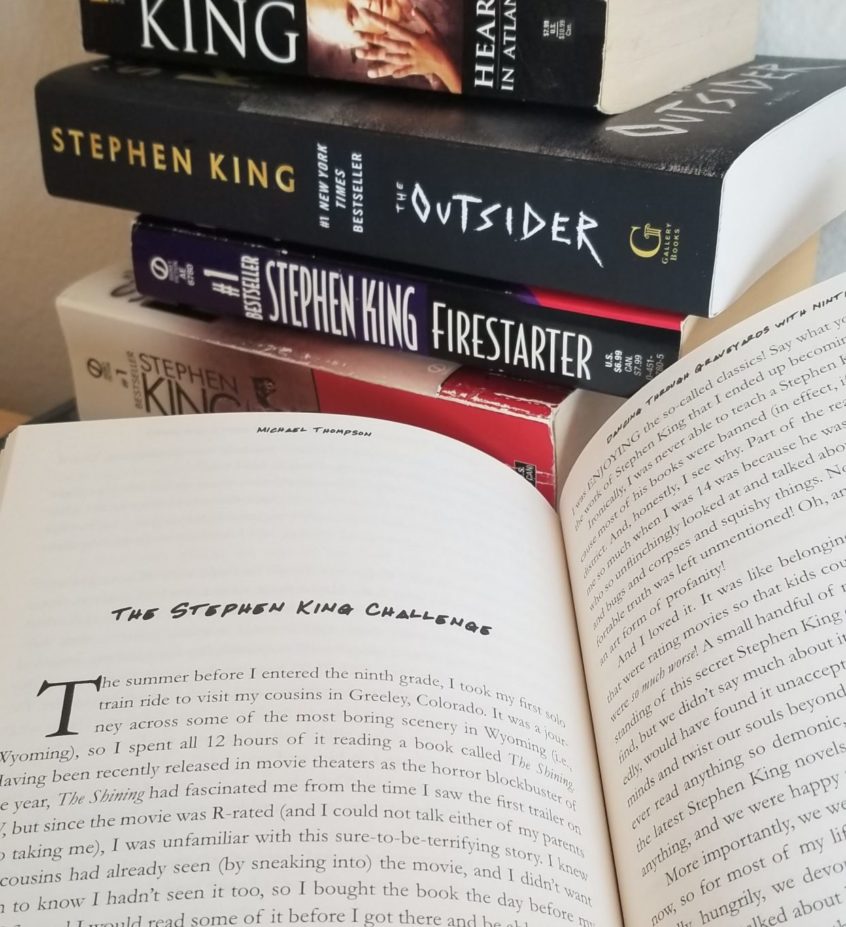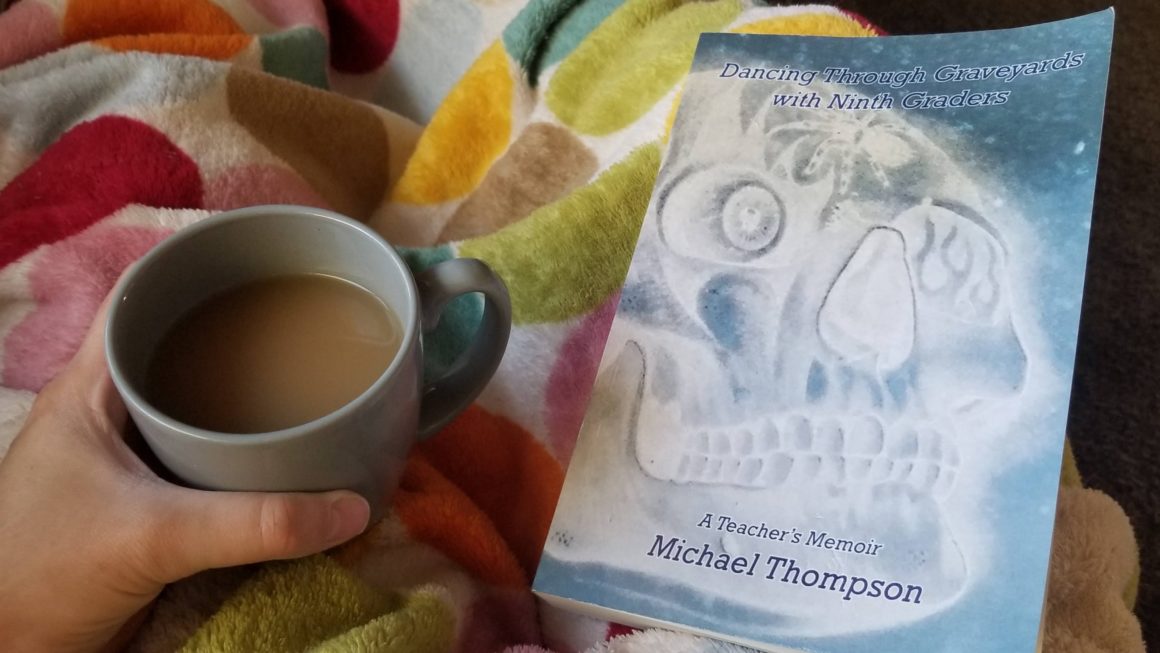My ninth grade English teacher recently retired. He wrote a memoir about his years wrangling junior high school students. I hope every kid has a teacher that inspires them the way Mr. Thompson did for so many, and especially for me. He was the first teacher who made me believe I could be a writer. That is why I decided the perfect first review for this blog would be of his book, Dancing Through Graveyards with Ninth Graders.
About the Book

Mr. Thompson (as he will always be known to me) taught ninth grade English between 1989 and 2019. He makes the distinction that he taught pre Covid-19, because he appreciates how much this virus has, is, and will continue changing the way school functions. His thirty years as a teacher spanned the technological boom. Tech plays a major role in his career, whether for good or evil he will for sure tell you. But it’s his students who keep him returning to his classroom despite an on-going fight with The System. Thompson’s memoir has a full cast of quirky and compelling students. They are the main story to a backdrop of rebellion against a system that has questionable motives.
My Review
I enjoyed Dancing Through Graveyards with Ninth Graders immensely. There was definitely a nostalgia factor in it for me. It has been over 15 years since I was a student of Mr. Thompson, but from the opening chapter of his book, I felt like I was back in his classroom. He is that once in a lifetime teacher that can engage students and have a positive influence that lasts for years, sometimes decades. I could hear Thompson’s voice in every word of this book. It felt like he was reading it to me while he strolled through the rows of his strangely arranged desks.
The narrative is a well thought out compilation of stories from his teaching career. Thompson sets the theme of the whole book, and his career, in the first sentence. He doesn’t want to be an apathetic teacher. The rest of his memoir divulges his struggle to meet that expectation. Each chapter is a new encounter with either a student, teacher, or administrator that has an effect on how Thompson views the school system and our society.
Any former student knows how sarcastic Mr. Thompson is. It is probably what allowed him to connect with his teenage students. The tone was set even before you walked through his door with a sign that read “WARNING: This class contains LANGUAGE!” The font for ‘language’ had a spooky Halloween vibe. There was no student safe from Thompson’s quick-witted banter. His voice in this book is no different. He is sarcastic and abrasive with more than a hint of cynicism. And yet, just as I was beginning to feel overwhelmed by his nihilistic description of a system he knows is failing, Thompson would introduce us to a student that would return balance and hope.
There are some real tragedies that Thompson faces during his career. He is open and vulnerable in his telling of these moments. I was moved to tears multiple times while reading this book. The compassion and empathy shown are a great counter weight to the cynicism that threatens to overwhelm at a few points. The mixture becomes the perfect recipe of cynicism, hope, philosophy, human story, teaching, and pure hilarity.

Mind Rummaging
Since this is my first post, I feel like I should explain this section just in case you haven’t read the ‘About Me’ page. I had a teacher (this very one in fact) ask the class why should we read. One of the reasons I read is because I enjoy what books have to teach me. I have found that even the easiest reads have some knowledge or lesson to pass along. After each review, I am going to explore one thing the book taught me, or made me think about. Please reach out and let me know if you picked up on the same thing, or if you caught something completely different. I am always interested in the many ways books can be read. So here it is, my first mind rummaging session.
I was immediately transported back to Mr. Thompson’s classroom every time I opened Dancing Through Graveyards with Ninth Graders. It felt comforting to have him teaching me again. This time I cared enough to actually pick out the lessons in his words, instead of having them spoon fed to me as if I were one of the “needy ones” Thompson increasingly saw in his classes. This book contained so many lessons for me it is hard to focus on just one.
I learned who I was as a student as I was immersed in memories of my school days. Looking back at those days from my adult (or something close to that) perspective, I am frustrated that I wasn’t more engaged with my studies and missed out on so many opportunities. Yet, with that same perspective, I feel more compassion for my younger self and for teenagers in general. Thompson’s depth of experience with this volatile age has shown me that it’s not about the opportunities we miss taking, but what we learn from the ones we do. Each of us has different challenges and the important thing is that we meet them head on. Even if you’re late, there is still progress to be made.
The lesson that slammed into me and cannot be shaken comes from this book teaching me about another book. When I was in Mr. Thompson’s class, we read Fahrenheit 451 by Ray Bradbury. I remember being horrified by the thought of a society that burned books. How could the entire world be ok with purposely getting rid of a solid form of entertainment and knowledge? Only when I read Thompson’s book Dancing Through Graveyards with Ninth Graders, did I realize the true horror of the world in Fahrenheit 451. They didn’t burn books to stop people from learning, or to keep better control over them, the burning began to end anything that was offensive. “Someone’s written a book on tobacco and cancer of the lungs? The cigarette people are weeping. Burn the book…”
Maybe I am late to the party in understanding this, which wouldn’t surprise me. But it hit me so hard because I think it resonates very closely with our society today. I think, or hope, the majority of people know that censorship is dangerous. It limits our ability to think critically. How can we decide what is right if we are never challenged with a differing opinion? What I worry about is whether we realize how much we are participating in censorship? A phrase that has become all too familiar in this age is, “That’s offensive to me, don’t talk to me anymore.” Isn’t that a form of censorship? I believe that there is a difference between not engaging and censoring. One is easy and dangerous. The other is complicated but leaves room for growth.
I am glad I got to experience being Mr. Thompson’s student again. I have come a long way in the last fifteen years, and yet he still found multiple ways to challenge my thinking with just one text. His very own text.

